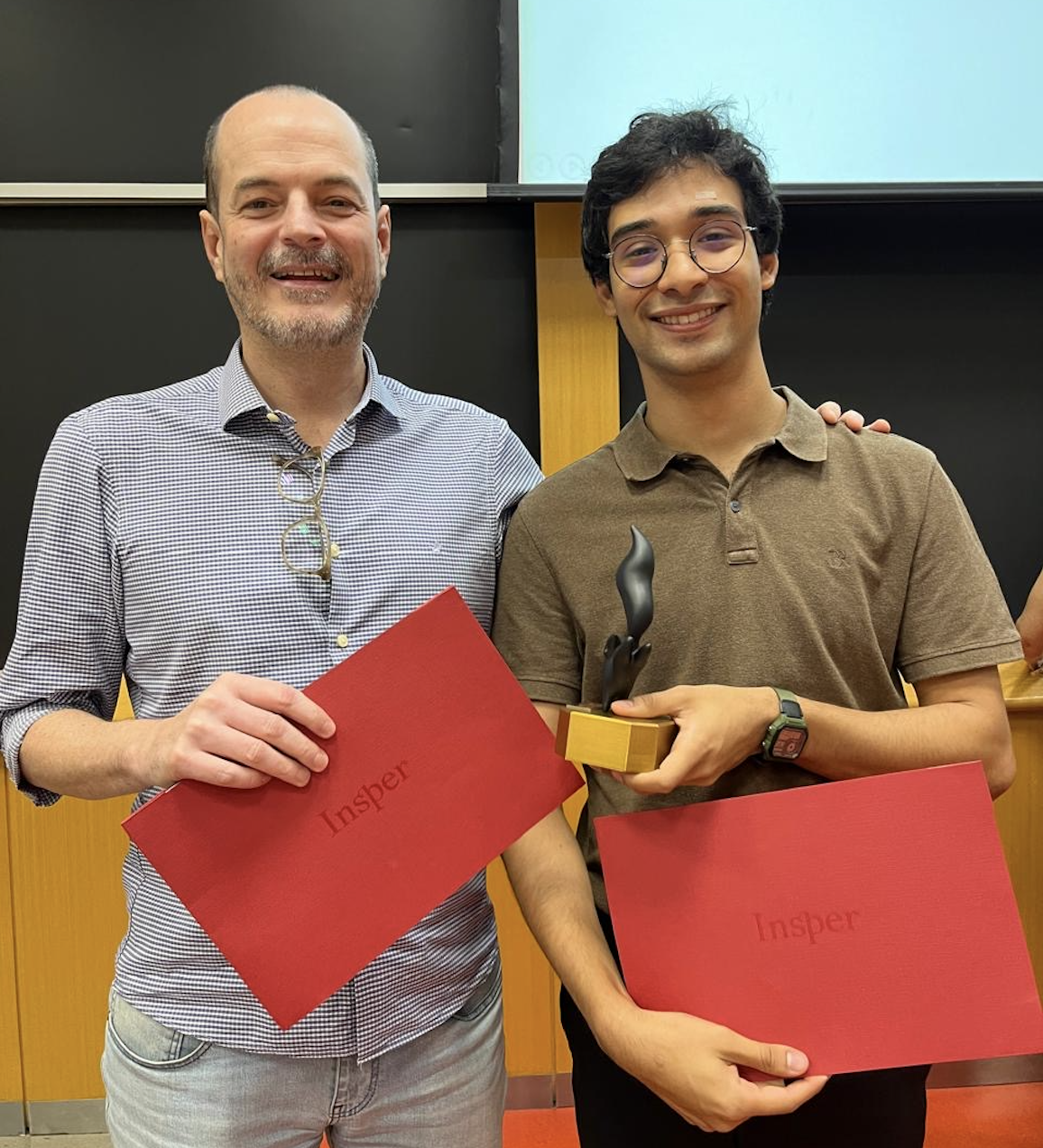 Professor Rodrigo Soares and student Victor de Faro Quadros
Professor Rodrigo Soares and student Victor de Faro Quadros
The official allocation of the use of public forests—as an indigenous reserve or an environmental protection area, for example—can help reduce illegal timber trade in the Amazon. This is one of the conclusions of the paper "Investigating the Relationship Between Amazon Deforestation and the Market for Primary Forest Products," by undergraduate student Victor de Faro Quadros, in his eighth semester of Economics at Insper. Advised by professors Rodrigo Soares, Leila Pereira, and Rafael Pucci, he received the Insper Scientific Initiation Award, chosen among participants of the 2nd Symposium of Scientific and Technological Initiation.
Quadros's project, conducted in the Institutional Program of Scientific and Technological Initiation Scholarships (PIBIC in Portuguese), attempted to understand how activity in the legal timber market is associated with illegal deforestation in undesignated public forests. Statistics from 2012 to 2022 were used in the research, forming a database on the flow of logs. “A broader context of the discussion about environmental crimes in the Legal Amazon is associated with the relationship between legal and illegal markets of logging activities in the Amazon,” explains Professor Soares. “It is assumed that a legalized sawmill, licensed to operate, can both curb and encourage illegal activities around it.”
The award caused some surprise for Quadros. “I dedicated myself a lot to scientific initiation and had reached a level of quality that left me satisfied, so I hoped my report would be one of the good works,” says the student. “But I knew that the works of other colleagues, including my friends, were also excellent. So, when they announced the award, it was a bit of a surprise. I was happy to have been chosen among several nice works, not only from the Economics course but from all areas.”
According to the researchers, there are many ways to commit an environmental crime. A legalized logging company can exploit prohibited areas and claim that it extracted the logs from the authorized area. Thus, there would be a legal market encouraging illegal activity in a cycle similar to money laundering. In another situation, the legalized logging company may actually be monitoring illegal extraction and collaborating with enforcement, but other people would be deforesting the prohibited areas around it. As the report shows, some weaknesses in the Forest Origin Document (DOF) process can help bypass the identification of illegal wood.
The treatment of DOF information and other sources posed the greatest challenge for Quadro's scientific initiation project, as he and Professor Soares acknowledge. "These are administrative data that are not ready for use, so the student had an enormous effort to download these data, put them in a readable format, and make a series of adjustments until understanding the data," says Soares. Subsequently, he needed to relate the legal movement of wood between municipalities to illegal deforestation. Another merit of the work was obtaining results from the use of georeferenced data and the application of econometric techniques.
The conclusion is that there is indeed a "wood laundering" cycle in the Legal Amazon. "The work shows that municipalities that are the source of much legalized wood transportation, with everything documented, experience greater deforestation in undesignated public forests," says Soares. "At the same time, the work also shows that in areas with designated use, whether indigenous reserves or environmental protection areas, this tends to happen much less. So, the official protection mechanisms seem to be reasonably effective in curbing this illegal activity."
This was Quadros' second scientific initiation project at Insper. In 2023, he had finished a study on the expenditures of Latin American governments during the covid-19 pandemic, guided by professor Fernando Ribeiro. "I was already familiar with the scientific initiation process, related to enrollment, duration, scholarship, and communication with the professor," says Quadros. "When I joined the Amazon rainforest project, I was interested in the type of data they were using in the study. I thought I would put into practice many things I had been studying in Economics. Analyzing real data helped my development and will be crucial for my career and my choices, even after I graduate."
Born in Salvador, Bahia, Quadros intends to pursue a career as a researcher. He also studies Applied and Computational Mathematics at the University of São Paulo. In July, he will start a two-year pre-doctoral program at the University of Chicago, made possible by the partnership between the U.S. institution and Insper. Quadros will work as a researcher for professors and economists Rodrigo Adão and Esteban Rossi-Hansberg. This will not be his first experience there. In 2023, Quadros did a two-month exchange in the University of Chicago's summer program.
The student noticed a continuous effort from Insper professors to present research career possibilities to undergraduate students through projects like PIBIC and PIBITI (technology initiation). In Soares' opinion, the effort was worth it. "Victor developed a research project from start to finish, involving literature review, data search, and processing of data that had not been used for this purpose, and the application of econometric techniques, generating results and conclusions," says the professor. In the future, the research could generate a more in-depth scientific paper with the potential for publication in an academic journal.






